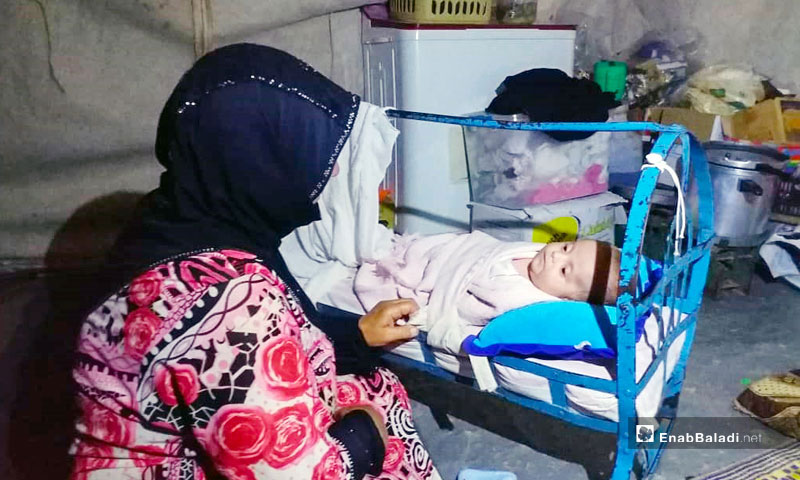



“The baby’s shoulder was stuck, and the mother was extremely exhausted; it was obvious! However, I had nothing other than my simple tools to help her deliver.”
The licensed midwife, Dahouk Abdullah al-Hakka, thus remembers what she calls “one of the toughest births she witnessed in the camp.”
“I recollected myself and managed to finally pull the baby out, safe. But the same stress overcomes me every time a similar problem faces me during births in the camp, especially when it is difficult to hospitalize the women for reasons beyond our control.”
The licensed midwife estimates that 70% of natural childbirths, witnessed by camps in Syria’s north, take place inside the camp. The caesarian sections, however, are conducted at private or public hospitals.
Pregnancy and birthing are considered of the major challenges faced by the internally displaced women in Idlib, toping other difficulties, such as lack of privacy and healthcare facilities, for one of each three displaced families in rural Idlib includes a pregnant women, according to a report published by the American World Vision Organization on August 1.
In addition to this, 51% of these families include an infant and a breastfeeding woman.
“Giving birth, women can come by many difficulties, including the shortage of specialized centers. Some births happen after midnight, which necessitates the presence of vehicles equipped for such cases,” midwife Dahouk told Enab Baladi.
Riham al-Khlaif was displaced due to the latest military campaign against her town, Qalaat al-Madiq, seeking refuge in the Kafr Lusein camp, north of Idlib.
Back then, she was six months pregnant, with three months only to separate her from the crisis of giving birth in the camp.
“When the day drew closer, we went to a public hospital near our camp. They refused to host me on the basis of lacking vacancies. I was forced to leave the hospital,” Riham told Enab Baladi.
Riham, accordingly, resorted to a private hospital to give birth to her second child, where her family had to pay a certain amount of money in return for the delivery process.
Riham managed to give birth in a hospital, but the World Vision’s report stresses that some of the women in Idlib’s camps are giving birth under the trees without any form of care.
Giving birth to a child inside the camp helped by a licensed midwife is a suitable solution for a significant portion of the internally displaced women. But still, both the embryo and the mother are at various risks, said doctor Mouna Khatab, who works at the Hand in Hand organization-affiliated hospital in Atmeh town, north of Idlib.
“A number of women suffer fatal complications while birthing at the camps, including severe hemorrhage, which the midwife cannot control, in addition to blood contamination for lacking a sanitized place within the camp,” Khatab told Enab Baladi.
The baby, however, “might be at risk of having a permanent disability due to difficulties during delivery, which makes giving birth at a hospital a better choice for the mother’s life and the health of her baby.”
On the same note, Dalal al-Taher, a Syria Civil Defense volunteer at al-Qataree Camp in the village of Kafr Lusein, north of Idlib, said that she bore witness to arduous births “where children suffered serious health-related complications.”
“The camp is short on specialized medical staffs, for the nearest hospital is three kilometers away, and most of the people do not have transportation means and cannot afford the fees of hospitalizing their children when the need arises,” she added.
The World Vision organization warns against the risk that might threaten newborns, pointing out that many infants spend their first a few days unprotected.
The organization also expressed concern over the difficulty of providing women and children with healthcare, given the nonstop shelling and displacement in Syria’s north.
if you think the article contain wrong information or you have additional details Send Correction